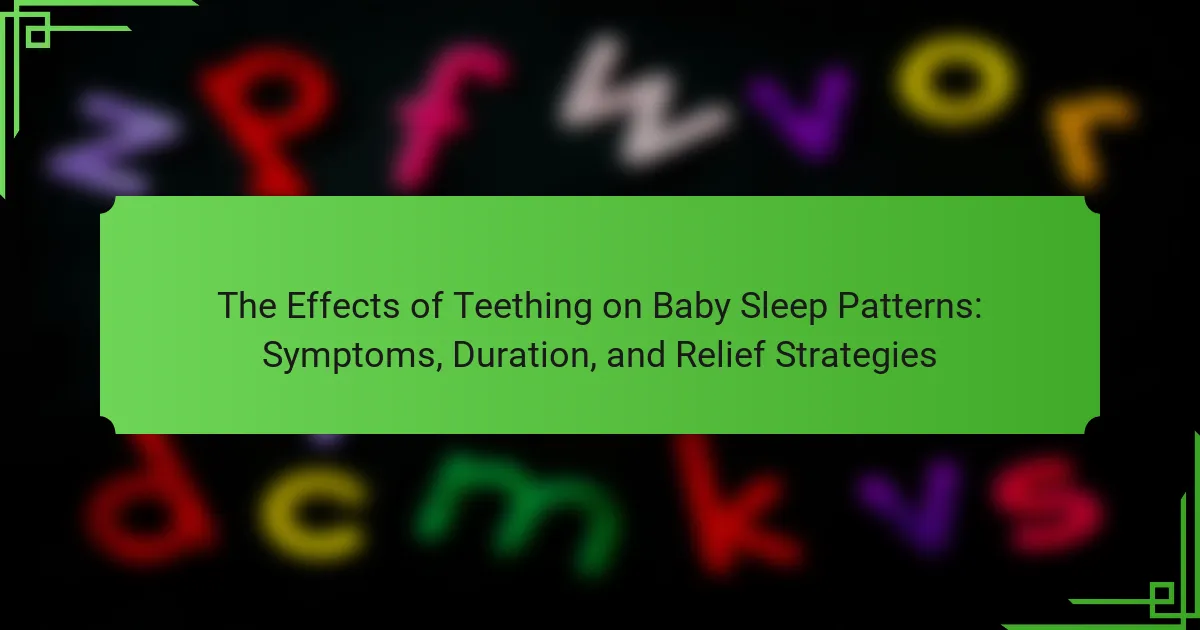Teething is a developmental process that can significantly disrupt baby sleep patterns, typically beginning around six months of age. Infants may experience symptoms such as irritability, swollen gums, and increased drooling, leading to increased night awakenings and shorter sleep durations. Research indicates that teething-related sleep disturbances can affect up to 30% of infants, resulting in restlessness and changes in feeding habits. Effective relief strategies include the use of teething rings, cold compresses, and over-the-counter pain relief medications, which pediatricians recommend for managing discomfort. Understanding these factors can help parents address sleep challenges associated with teething.

What are the Effects of Teething on Baby Sleep Patterns?
Teething can significantly disrupt baby sleep patterns. Babies may experience discomfort and pain during teething, leading to increased night awakenings. This discomfort can result in shorter sleep durations and difficulty falling asleep. Research indicates that teething can cause irritability and restlessness in infants, further impacting sleep. According to a study published in the journal “Pediatrics,” teething symptoms can lead to sleep disturbances in up to 30% of infants. As teeth emerge, babies may also exhibit changes in feeding habits, which can contribute to sleep issues. Overall, the effects of teething on baby sleep patterns can be profound and multifaceted.
How does teething impact a baby’s overall sleep quality?
Teething negatively impacts a baby’s overall sleep quality. Babies often experience discomfort and pain during teething. This discomfort can lead to increased wakefulness during the night. Research indicates that teething may cause irritability and restlessness. According to a study published in the Journal of Pediatric Dentistry, teething symptoms can disrupt sleep patterns. Babies may cry more frequently and have difficulty settling down. The duration of teething can vary, prolonging sleep disturbances. Overall, teething can significantly affect a baby’s ability to sleep soundly.
What specific sleep disturbances are associated with teething?
Teething is associated with several specific sleep disturbances in infants. These disturbances include increased night awakenings, difficulty falling asleep, and shorter sleep duration. Babies may also experience restlessness during sleep. The discomfort caused by emerging teeth can lead to irritability, making it challenging for them to settle down. Research indicates that teething pain can disrupt sleep cycles, resulting in fragmented sleep. Additionally, some infants may exhibit changes in sleep patterns, such as increased fussiness or crying during the night. These disturbances are commonly reported by parents during the teething phase.
How do sleep patterns change during the teething process?
Sleep patterns often become disrupted during the teething process. Babies may experience increased night awakenings and difficulty falling asleep. This change is typically due to discomfort and pain associated with emerging teeth. Research shows that teething can lead to shorter sleep durations. Parents may notice their infants are more irritable and fussy at night. Additionally, some babies may refuse to sleep altogether. The combination of pain and discomfort can significantly impact overall sleep quality. Understanding these changes can help parents manage sleep disturbances effectively.
What symptoms indicate that a baby is teething?
Common symptoms indicating that a baby is teething include increased drooling, irritability, and difficulty sleeping. Babies may also experience swollen gums and a decreased appetite. Some may develop a mild fever. Rubbing their gums or chewing on objects is also typical behavior. These symptoms generally occur as teeth begin to break through the gums. Research indicates that teething can start as early as six months of age. According to the American Academy of Pediatrics, these signs can vary in intensity among infants.
What physical signs should parents look for?
Parents should look for swollen gums as a key physical sign of teething. Swollen gums indicate that teeth are pushing through the gums. Increased drooling is another common sign during this period. Babies may also exhibit irritability and fussiness due to discomfort. Chewing on objects or fingers is a typical behavior associated with teething. Changes in sleep patterns can occur, as discomfort may disrupt sleep. Parents may notice a decreased appetite or refusal to eat solid foods. Lastly, some babies may develop a mild rash around the mouth from increased drooling.
How can behavioral changes signal teething discomfort?
Behavioral changes can signal teething discomfort in infants. Common signs include increased irritability and fussiness. Babies may also exhibit changes in sleep patterns, such as waking more frequently at night. They might show a decreased appetite or refuse to eat due to gum pain. Excessive drooling is another indicator, often accompanied by chewing on objects. These behaviors align with the physical discomfort caused by emerging teeth. Research supports that teething can lead to noticeable shifts in an infant’s mood and behavior.
How long does the teething process typically last?
The teething process typically lasts from six months to three years. Most babies begin teething around six months of age. The process involves the eruption of primary teeth, also known as baby teeth. Each tooth may take several days to weeks to fully emerge. The duration can vary significantly among individual infants. Some may experience teething symptoms for a shorter period, while others may take longer. By the age of three, most children have a complete set of primary teeth. This timeline is supported by pediatric dental guidelines.
What is the average duration of teething for infants?
The average duration of teething for infants is about six months. Teething typically begins around six months of age. However, this duration can vary among infants. Some may experience teething for a shorter period, while others may take longer. The process usually continues until all primary teeth have emerged, which can take up to three years. Research indicates that the timing and duration of teething can differ based on individual development.
How does the timing of tooth eruption affect sleep?
The timing of tooth eruption can significantly affect sleep patterns in infants. During the teething process, which typically occurs between 6 months and 2 years of age, infants may experience discomfort and pain. This discomfort can lead to increased irritability and difficulty falling asleep. Research indicates that teething may disrupt sleep cycles, causing more frequent awakenings at night. A study published in the Journal of Pediatrics found that infants who are teething may sleep up to 2 hours less per night compared to those who are not. Additionally, the timing of tooth eruption can coincide with developmental milestones, which may further impact sleep quality.

What are Effective Relief Strategies for Teething Discomfort?
Effective relief strategies for teething discomfort include using teething rings, applying cold compresses, and providing pain relief medication. Teething rings help massage the gums, which can alleviate pain. Cold compresses numb the area and reduce swelling. Over-the-counter pain relief medications, such as acetaminophen or ibuprofen, are effective for reducing discomfort in infants. According to the American Academy of Pediatrics, these medications can be safely administered to infants over six months old. Additionally, gentle gum massage with a clean finger can provide immediate relief. These strategies are widely recommended by pediatricians for managing teething pain.
What remedies can help soothe a teething baby?
Cold items can help soothe a teething baby. Teething rings chilled in the refrigerator provide relief. Cold washcloths can also be effective when given to the baby to chew on. Gentle gum massages with clean fingers can ease discomfort. Over-the-counter pain relievers, like acetaminophen or ibuprofen, may be used under pediatrician guidance. Some parents find that homeopathic remedies also offer relief. Distraction with toys or engaging activities can help take the baby’s mind off the pain. Each method targets the discomfort associated with teething, providing comfort to the baby.
How do teething rings and cold compresses provide relief?
Teething rings and cold compresses provide relief by soothing gum inflammation and reducing pain. Teething rings are often made of soft, textured materials that babies can chew on. This chewing action helps to alleviate pressure on the gums. Cold compresses, applied to the gums, numb the area and reduce swelling. The cold temperature constricts blood vessels, which decreases inflammation. Both methods can be effective in providing immediate comfort to a teething baby. Studies indicate that physical stimulation and cold therapy can significantly lessen teething discomfort.
What role do over-the-counter medications play in managing pain?
Over-the-counter medications play a significant role in managing pain. These medications, such as acetaminophen and ibuprofen, are commonly used for pain relief. They work by reducing inflammation and blocking pain signals in the brain. Research indicates that acetaminophen is effective for mild to moderate pain. Ibuprofen, a nonsteroidal anti-inflammatory drug, also helps reduce fever. Studies show that these medications can improve comfort in infants experiencing pain from teething. Proper dosing is crucial for safety and effectiveness. Overall, over-the-counter medications provide accessible pain management options for caregivers.
How can parents establish better sleep routines during teething?
Parents can establish better sleep routines during teething by creating a consistent bedtime schedule. This involves putting the baby to bed at the same time each night. A calming pre-sleep routine can help signal that it’s time to sleep. This can include activities like a warm bath or gentle rocking. Parents should also ensure the sleep environment is comfortable and quiet. This includes a dark room and a comfortable crib. Offering teething toys before bedtime may also help soothe discomfort. Research indicates that a consistent routine can improve sleep quality for infants. Studies show that babies benefit from predictable sleep patterns, which can ease the transition during teething.
What bedtime practices can help minimize sleep disruptions?
Establishing a consistent bedtime routine can help minimize sleep disruptions. A regular schedule reinforces the body’s internal clock. This routine should include calming activities such as reading or gentle rocking. Limiting screen time before bed reduces exposure to blue light. A dark, quiet room promotes better sleep quality. Keeping the room at a comfortable temperature aids in falling asleep. Avoiding heavy meals close to bedtime prevents discomfort. These practices are supported by research showing improved sleep patterns. Studies indicate that consistency and a calming environment significantly enhance sleep quality.
How can soothing techniques improve a baby’s sleep during teething?
Soothing techniques can significantly improve a baby’s sleep during teething by alleviating discomfort. Teething often causes pain and irritability, disrupting sleep patterns. Techniques such as gentle rocking, soft music, or a warm bath can provide comfort. These methods help calm the baby, making it easier for them to fall asleep. Additionally, teething toys can soothe sore gums, further reducing discomfort. Research indicates that comfort measures can lead to longer sleep durations for infants. Therefore, implementing soothing techniques can create a more peaceful sleep environment during teething.

What Should Parents Know About Teething and Sleep?
Teething can disrupt a baby’s sleep patterns. The process usually begins around six months of age. Symptoms include irritability, swollen gums, and increased drooling. These discomforts can lead to frequent awakenings during the night. Studies show that teething can cause sleep disturbances lasting several nights. Parents can help soothe their baby with teething rings or cold washcloths. Maintaining a consistent bedtime routine may also aid in calming the baby. Understanding these factors can help parents manage sleep challenges during teething.
What are common misconceptions about teething and sleep?
Common misconceptions about teething and sleep include the belief that teething always causes sleep disturbances. In reality, not all babies experience significant sleep issues during teething. Another misconception is that teething pain leads to fever. Research shows that teething may cause mild temperature increases but not actual fever. Some parents think teething symptoms last for weeks. However, symptoms typically last only a few days as each tooth emerges. Additionally, many believe that teething causes diarrhea. While some babies may experience loose stools, this is not a direct result of teething. Understanding these misconceptions can help parents manage expectations during this developmental stage.
How can parents differentiate between teething pain and other issues?
Parents can differentiate between teething pain and other issues by observing specific symptoms. Teething pain typically includes swollen gums, increased drooling, and a desire to chew on objects. Other issues, such as illness, may present with fever, diarrhea, or persistent crying. Teething symptoms usually coincide with the eruption of teeth. The timing of symptoms is crucial; teething often occurs around 6 months of age. If symptoms persist or worsen, it may indicate another health problem. Consulting a pediatrician can provide clarity on any concerns.
Why is it important to monitor sleep changes during teething?
Monitoring sleep changes during teething is important because it helps identify discomfort levels in infants. Teething can cause pain and irritability, leading to disrupted sleep patterns. Tracking these changes allows caregivers to provide timely interventions. For example, recognizing sleepless nights can prompt the use of soothing techniques or pain relief methods. Research indicates that sleep disturbances during teething can affect overall infant health and development. By monitoring these changes, caregivers can ensure better sleep quality for the baby, which is essential for growth.
What practical tips can help parents manage teething-related sleep issues?
To manage teething-related sleep issues, parents can use several practical tips. Providing a teething ring can help soothe sore gums. A cold washcloth can also provide relief when chewed. Maintaining a consistent bedtime routine is essential for comfort. Parents should ensure the sleep environment is calm and quiet. Offering gentle massages on the baby’s gums can ease discomfort. Using over-the-counter pain relief, like acetaminophen, may be beneficial. Monitoring the baby’s sleep patterns can help identify triggers. Finally, patience and reassurance are key during this challenging time.
How can parents create a calming sleep environment for teething babies?
Parents can create a calming sleep environment for teething babies by ensuring a comfortable room temperature. A cool, dark, and quiet room promotes better sleep. Soft lighting, like a nightlight, can provide reassurance without being too stimulating. White noise machines or soft lullabies can mask disruptive sounds. A consistent bedtime routine helps signal to the baby that it’s time to sleep. Additionally, offering a teething toy before bed may provide comfort. These strategies help reduce discomfort and promote relaxation during teething.
What strategies can be implemented to comfort a teething baby at night?
To comfort a teething baby at night, parents can employ several effective strategies. Offering a chilled teething ring can soothe sore gums. Gentle gum massage with a clean finger provides immediate relief. A warm bath before bedtime can help calm the baby. Using a soft, cool washcloth for chewing can also be beneficial. Providing comfort through cuddling and holding helps the baby feel secure. Maintaining a consistent bedtime routine can promote better sleep. If necessary, administering age-appropriate pain relief medication can alleviate discomfort. According to pediatric guidelines, these methods are safe and effective for managing teething pain.
The main entity of the article is “teething” and its impact on baby sleep patterns. The article provides a comprehensive overview of how teething disrupts sleep, detailing symptoms such as increased irritability, swollen gums, and changes in feeding habits that can lead to sleep disturbances. It discusses the typical duration of teething, which ranges from six months to three years, and highlights effective relief strategies including teething rings, cold compresses, and over-the-counter pain medications. Additionally, the article addresses common misconceptions about teething and sleep, offers practical tips for managing sleep issues, and emphasizes the importance of monitoring sleep changes during this developmental stage.
